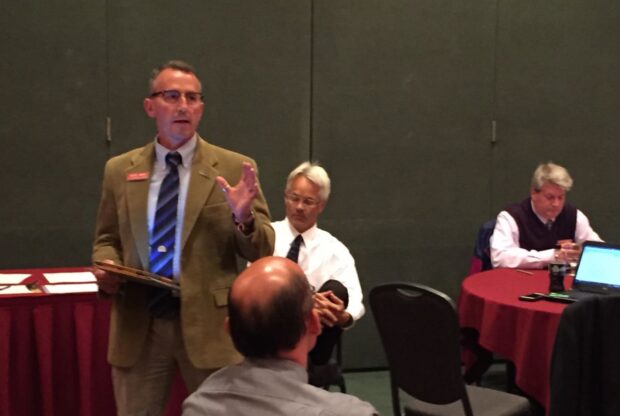A crowd of more than 30 people spent two hours Monday night debating a slate of proposed science standards that were rejected by the Legislature.

Officials from the State Department of Education conducted the meeting at a Boise hotel, which was the fifth in a series of six meetings held across the state.
State officials estimated Monday’s crowd to be the largest they have seen since the meetings began last week in Coeur d’Alene.
The crowd included a mix of parents, taxpayers and teachers. Public testimony ran 11 to six in support of the proposed standards, but not everyone who attended chose to testify. Additionally, state officials stressed that the meeting was not a popularity contest. Instead, education officials recorded all comments and will combine them with all written comments submitted.
“Superintendent (Sherri) Ybarra is very interested in your comments and suggestions,” Francoise Cleveland of the State Department of Education told Monday’s crowd. “This is the first step so we can gather your comments from here and look at them.”
SDE officials conducted the meeting after legislators rejected the proposed science and humanities standards earlier this year without allowing for debate or public testimony. Lawmakers said they would not vote on the standards because not enough public input had been gathered as the proposed standards were developed.
However, documents show officials had followed all rules and laws governing public input in the development of standards and administrative rules. It also appeared that concerns over the age and creation of the universe, evolution and humans’ role in global warming affected lawmakers’ decision.
Monday’s meeting echoed those concerns, with several people who opposed the standards saying it is inappropriate to teach evolution and human involvement in climate change in public schools.
- “My specific concern is they address theories such as human-caused global warming as if they are settled science,” parent Mila Wood said. “Where is the evidence that the adoption of the standards assures us anything but yet another expensive, untested ED experiment?”
- Midvale veterinarian Bob Compton argued that teaching evolution is akin to teaching atheism in the classroom. He said the state’s prohibition on teaching religious doctrine to students also applies to atheism. Because of the separation of church and state clauses, Compton argued that adopting the proposed science standards would be unconstitutional. Compton was a member of the committee that developed the proposed standards, and said he also shared his concerns with the committee last year.
- Grandparent Rick Carter argued that dinosaurs died out “several thousand years ago, not millions of years ago,” which “shoots a huge hole” in the way the standards treat the age of the universe.
Idaho’s existing science standards already include the subjects of evolution, the age of the universe and discussion of how human activities affect the Earth and environment.
Those in support of the proposed standards praised them as a set of logical, inquiry based standards that build upon each other and encourage students to draw their on conclusions.
- “The standards are quite accurate, frankly, from what I’ve read and I would like to go back in school and be learning from these,” retired hydrologist Kathy Peter said.
- “If you look at the standards clearly… getting students to be and act like scientists are the key to the standards. We want science-literate students. And all these (hiring) companies want science-literate students,” said Chris Taylor, Boise Independent School District’s supervisor of science and social studies. Taylor was also one of the authors of the proposed science standards.
- “Idaho’s (existing) standards are worthless for new teachers trying to figure out what to teach and how to teach it. So I started going to the Next Generation Science Standards (which were a basis for Idaho’s proposed new standards) and I could actually use those to create curriculum.”
The lengthy discussion at Monday’s meeting stood in contrast to last Thursday’s meeting in Idaho Falls, which only attracted one parent and a handful of educators.
The final SDE public meeting on standards and rulemaking runs from 6 p.m. to 8 p.m. today at the Twin Falls Hilton Garden Inn, 1741 Harrison St. North.
Anyone wishing to instead submit written comments on the standards or proposed rules has until Friday to do so. Comments may be submitted online.
After this comment window closes, leaders from the State Department of Education will reconvene last year’s science standards development committee to consider public feedback. The committee will have the ability to review, keep or change the proposed standards. After the committee finishes, the standards will be sent to the State Board of Education for action during a public meeting, likely in August.
After the State Board of Education takes action, the standards would then go out for public comment again before they are submitted to the Legislature in the form of an administrative rule.
The proposed science standards rejected by the Legislature are 109 pages in length and available to review online.
Further reading: Feb. 11 “Teachers defend rejected science standards.”
